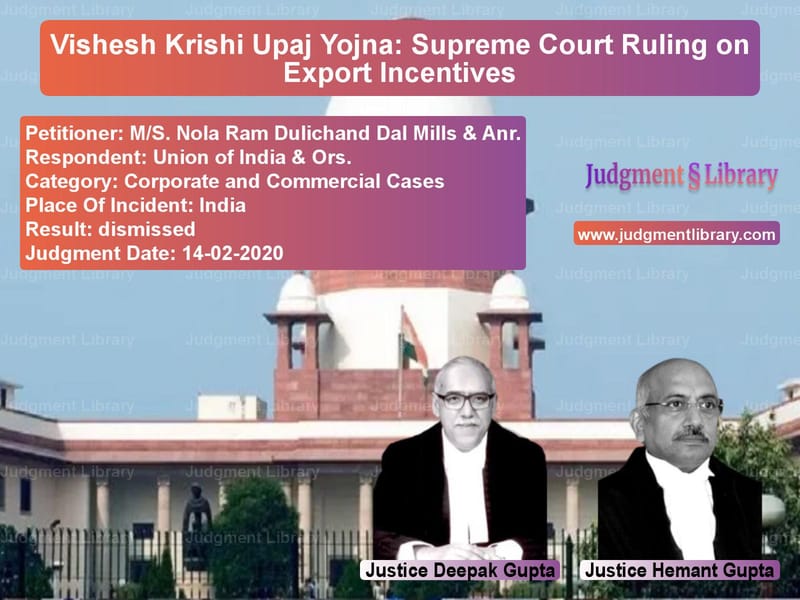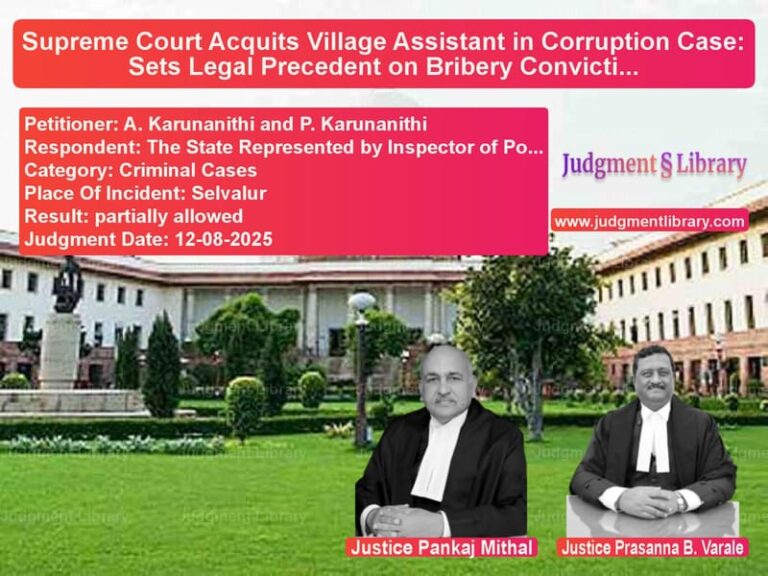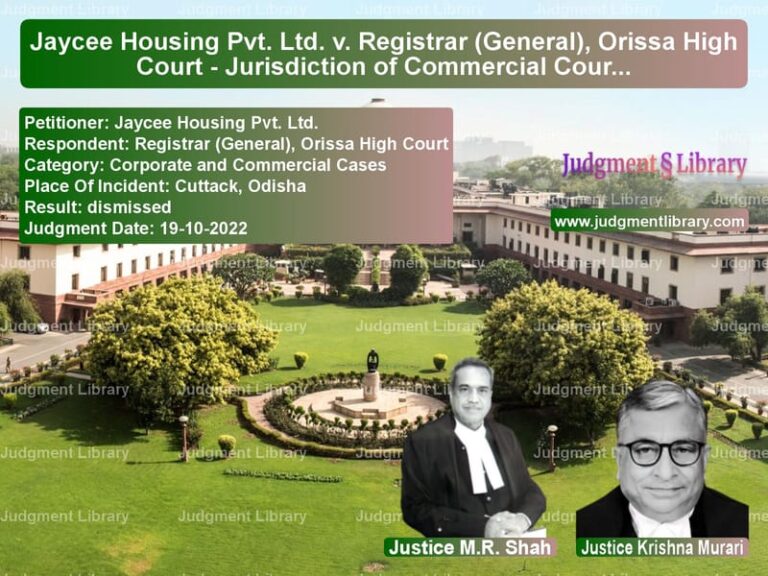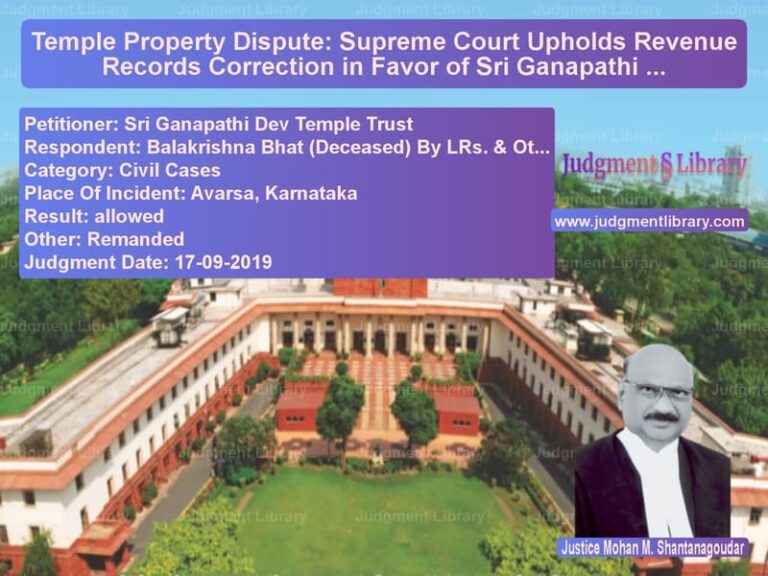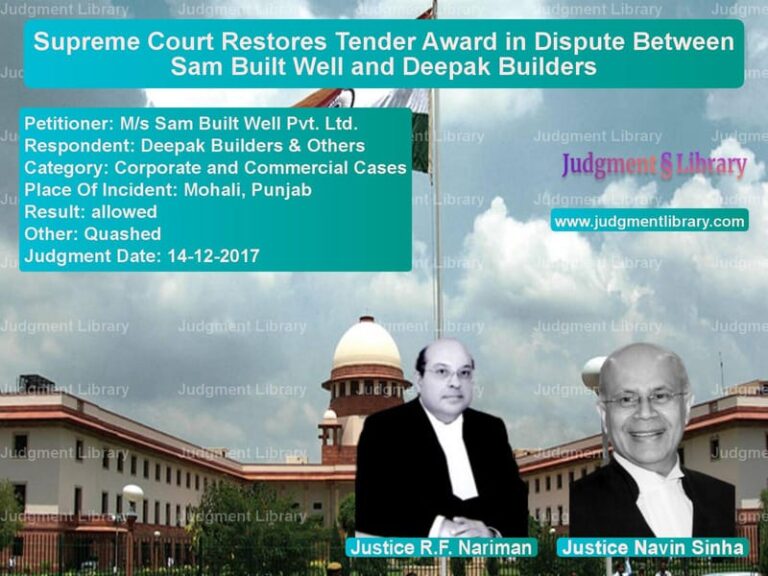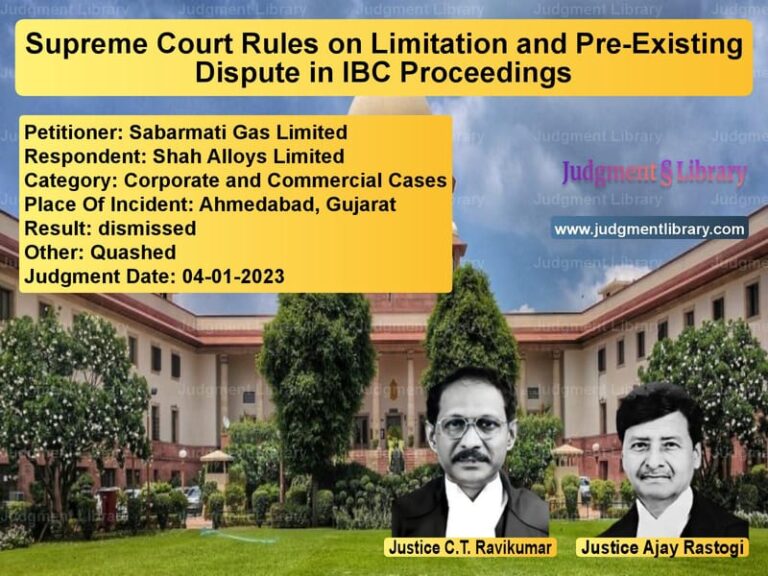Vishesh Krishi Upaj Yojna: Supreme Court Ruling on Export Incentives
The case of M/S. Nola Ram Dulichand Dal Mills & Anr. v. Union of India & Ors. revolves around the eligibility of export-oriented units (EOUs) for benefits under the Vishesh Krishi Upaj Yojna (VKUY). The Supreme Court had to decide whether EOUs, which were specifically excluded from the scheme, could indirectly claim benefits through third-party transactions. The ruling has significant implications for India’s foreign trade policy and export incentive structures.
Background of the Case
Under the Foreign Trade Policy 2004-09, the government introduced various schemes to promote exports, including the VKUY. This scheme was designed to provide duty credit incentives for the export of agricultural and village industry products. However, in 2006, an amendment excluded 100% export-oriented units (EOUs) and Special Economic Zone (SEZ) units from claiming these benefits.
The appellants, M/S. Nola Ram Dulichand Dal Mills & Anr., were engaged in the manufacturing and trading of Guar Gum and its derivatives. They purchased Guar Gum Powder from M/S. Neelkanth Polymers, an EOU, and exported it under their own name, claiming VKUY benefits. The authorities rejected their claim, arguing that since EOUs were explicitly excluded, indirect claims through merchant exporters were also not permissible.
Legal Issues Involved
- Whether EOUs could indirectly claim VKUY benefits through merchant exporters.
- Whether the 2009 government circular clarifying the exclusion of EOUs was valid.
- Whether the exclusion of EOUs from the VKUY scheme violated constitutional or trade policy principles.
- Whether the amendment restricting EOUs’ eligibility was discriminatory or arbitrary.
Petitioners’ Arguments
The appellants contended that:
- The VKUY scheme, as originally notified, did not exclude EOUs explicitly.
- The exclusion of EOUs in the 2006 amendment should not apply to transactions involving merchant exporters.
- The 2009 circular, which further clarified the exclusion, was not a valid amendment to the trade policy and was issued without legal authority.
- The denial of benefits violated the principle of promissory estoppel, as exporters had made financial commitments based on earlier policies.
- EOUs and SEZs were being unfairly discriminated against compared to domestic tariff area (DTA) units.
Respondents’ Arguments
The Union of India defended its policy by arguing:
- The Foreign Trade Policy (FTP) is dynamic, and the government has the right to modify or amend schemes based on economic needs.
- EOUs already enjoy several tax benefits, and allowing VKUY benefits would lead to double incentives.
- The 2009 circular was not an amendment but a clarification of the existing policy.
- Allowing EOUs to claim benefits through third-party merchant exporters would defeat the purpose of the amendment.
- The Supreme Court, in earlier cases, had upheld the government’s right to amend trade policies in the public interest.
Supreme Court’s Analysis
The Supreme Court analyzed the Foreign Trade (Development and Regulation) Act, 1992, and relevant trade policy provisions. The Court held:
- The government has the authority under Section 5 of the Act to amend the trade policy and specify eligibility criteria for incentives.
- The exclusion of EOUs from VKUY benefits was a policy decision based on economic rationale and was not arbitrary or discriminatory.
- The 2009 circular was a clarification, not a new amendment, and did not require separate legislative approval.
- The VKUY scheme’s purpose would be defeated if EOUs were allowed to claim benefits indirectly through merchant exporters.
- The argument of promissory estoppel was not applicable as export incentives are subject to change based on policy considerations.
Final Judgment
The Supreme Court ruled in favor of the Union of India, holding that:
- EOUs and SEZ units are not eligible for VKUY benefits, either directly or through merchant exporters.
- The 2009 circular was valid as a clarification of the 2006 amendment.
- Export incentives can be modified or withdrawn by the government in the public interest.
- The appeals were dismissed, and the denial of benefits was upheld.
Impact of the Judgment
This ruling has far-reaching implications for India’s foreign trade policy:
- It reinforces the government’s authority to modify export incentives based on economic conditions.
- It prevents EOUs from bypassing restrictions by using merchant exporters.
- It upholds the principle that policy clarifications do not require legislative amendments.
- It emphasizes that incentives are privileges, not rights, and can be revoked in the public interest.
Overall, this judgment ensures that export incentives are applied uniformly and prevents unintended financial advantages to specific sectors.
Petitioner Name: M/S. Nola Ram Dulichand Dal Mills & Anr..Respondent Name: Union of India & Ors..Judgment By: Justice Deepak Gupta, Justice Hemant Gupta.Place Of Incident: India.Judgment Date: 14-02-2020.
Don’t miss out on the full details! Download the complete judgment in PDF format below and gain valuable insights instantly!
Download Judgment: MS. Nola Ram Dulich vs Union of India & Ors Supreme Court of India Judgment Dated 14-02-2020.pdf
Direct Downlaod Judgment: Direct downlaod this Judgment
See all petitions in unfair trade practices
See all petitions in Corporate Compliance
See all petitions in Judgment by Deepak Gupta
See all petitions in Judgment by Hemant Gupta
See all petitions in dismissed
See all petitions in supreme court of India judgments February 2020
See all petitions in 2020 judgments
See all posts in Corporate and Commercial Cases Category
See all allowed petitions in Corporate and Commercial Cases Category
See all Dismissed petitions in Corporate and Commercial Cases Category
See all partially allowed petitions in Corporate and Commercial Cases Category

